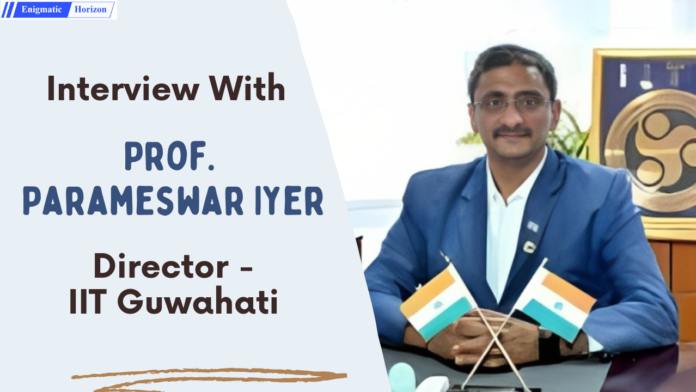Robin Bhuyan (Editor)
Naba Kumar Sharma (Staff Reporter)
Krishnakshee Sharma
IIT Guwahati is considered one of the top technical unversities not just in North East India, but the entire country. As per the latest NIRF ranking in 2023, the institute was ranked seventh among the Engineering colleges in India. Enigmatic Horizon recently had a conversation with Prof. Parameswar Iyer, who has been serving as the institute’s Director since December 2022. Let us take a look.
EH: When did you become the Director of IIT Guwahati, and what steps have you taken to improve the institution?
PI: I assumed charge on December 18, 2022. Since then, I’ve focused on intensifying the good work already being done at IIT Guwahati. Our main goal has been to improve the perception of the institution and showcase the excellent work of our students and faculty members. We want to enhance our standing at both the national and international levels.
EH: How has IIT Guwahati promoted social responsibility among students and the people?
PI: Social responsibility is a major priority for us. During the pandemic, we collaborated with the government to provide assistance to the people. We also offered our infrastructure for isolation camps etc. We have participated in national integration programs, bringing students from different states together to learn about each other’s culture and heritage. We have supported women’s self-help groups, enhanced education infrastructure, and organized various educational programs. Our students have been involved in setting up tinkering labs in schools across the state.
EH: Is the research work at IIT Guwahati implemented practically, or does it remain confined within the institution?
PI: Research conducted at IIT Guwahati doesn’t remain confined to the institution. We encourage our researchers to publish their work in top-quality international peer-reviewed journals. We also focus on patents and technology transfer to the industry. Our collaborative projects and rankings in research indicate that our research work has a significant impact and it also benefits society.
EH: What are your thoughts on the future and impact of Artificial Intelligence (AI) in India? People are worried that it will take up jobs and destroy human creativity.
PI: Artificial intelligence will definitely play a crucial role in various aspects of technology and life. While concerns about its impact exist, we have always found ways to use technology for the best possible outcomes. For instance, when nuclear energy was developed, there were concerns that it would only lead to the production of nuclear bombs. However, except for a couple of unfortunate incidents during the World War, nuclear technology has primarily been used for peaceful purposes, providing energy worldwide.
The same concerns arose when the Internet was developed, with people believing that email would replace postal and courier services. In reality, technologies often complement and benefit each other. I believe AI technologies have the potential to enhance our lifestyles, improve human well-being, and contribute to the sustainability of future generations. However, it is crucial that we adopt these technologies responsibly and in ways that align with sustainability principles. We must preserve renewable energy, minimize carbon footprints to combat global warming, and develop technologies that promote sustainability for all. Education plays a vital role in ensuring the next generation is at the forefront of these developments, understanding the ethical and responsible use of technology.
AI, along with other technologies like machine learning and virtual reality, can improve our lifestyle, enhance human lives, and contribute to sustainability. Responsible adoption and utilization of AI are key to ensuring its positive impact on society.
EH: What challenges does IIT Guwahati currently face, and how do you plan to tackle them?
PI: Attracting the best intellectuals at all levels and meeting student expectations for diverse learning opportunities are our primary challenges. We are actively working to find quality faculty members and broaden our knowledge delivery in multidisciplinary areas. Furthermore, our country and region face the challenge of employment. This can only be tackled by fostering cautious entrepreneurship and supporting promising startups. We are actively working toward creating an environment conducive to entrepreneurship and addressing the issue of employment.
EH: How does IIT Guwahati compare to other IITs in India, and what steps have you taken to elevate the institution to an international level?
PI: IIT Guwahati has consistently maintained high standards and achieved recognition both nationally and internationally. We have excelled in various rankings and have been recognized for our research contributions, sustainability initiatives, and academic excellence. To further elevate the institution to an international level, we are focusing on expanding collaborations with international universities and research organizations, enhancing international exchange programs, and encouraging faculty members and students to participate in international conferences and research projects. These efforts will not only strengthen our presence internationally but also provide valuable exposure and opportunities for our students.
EH: Do you believe that science and technology, if misused, can lead to the demise of humanity?
PI: Misuse of science and technology can indeed have adverse consequences. Sustainability is a critical aspect we need to consider, as we must ensure that our technological advancements are used for the benefit of mankind. By developing technologies that are sustainable and environment friendly, we can mitigate risks and pave the way for a better future.
